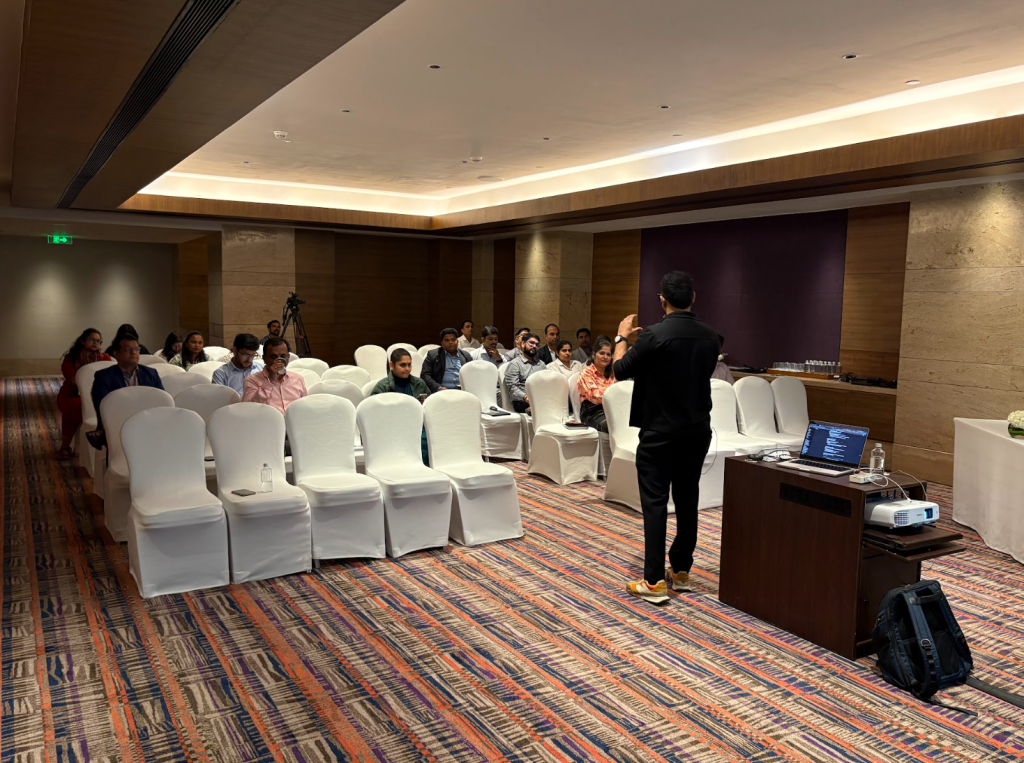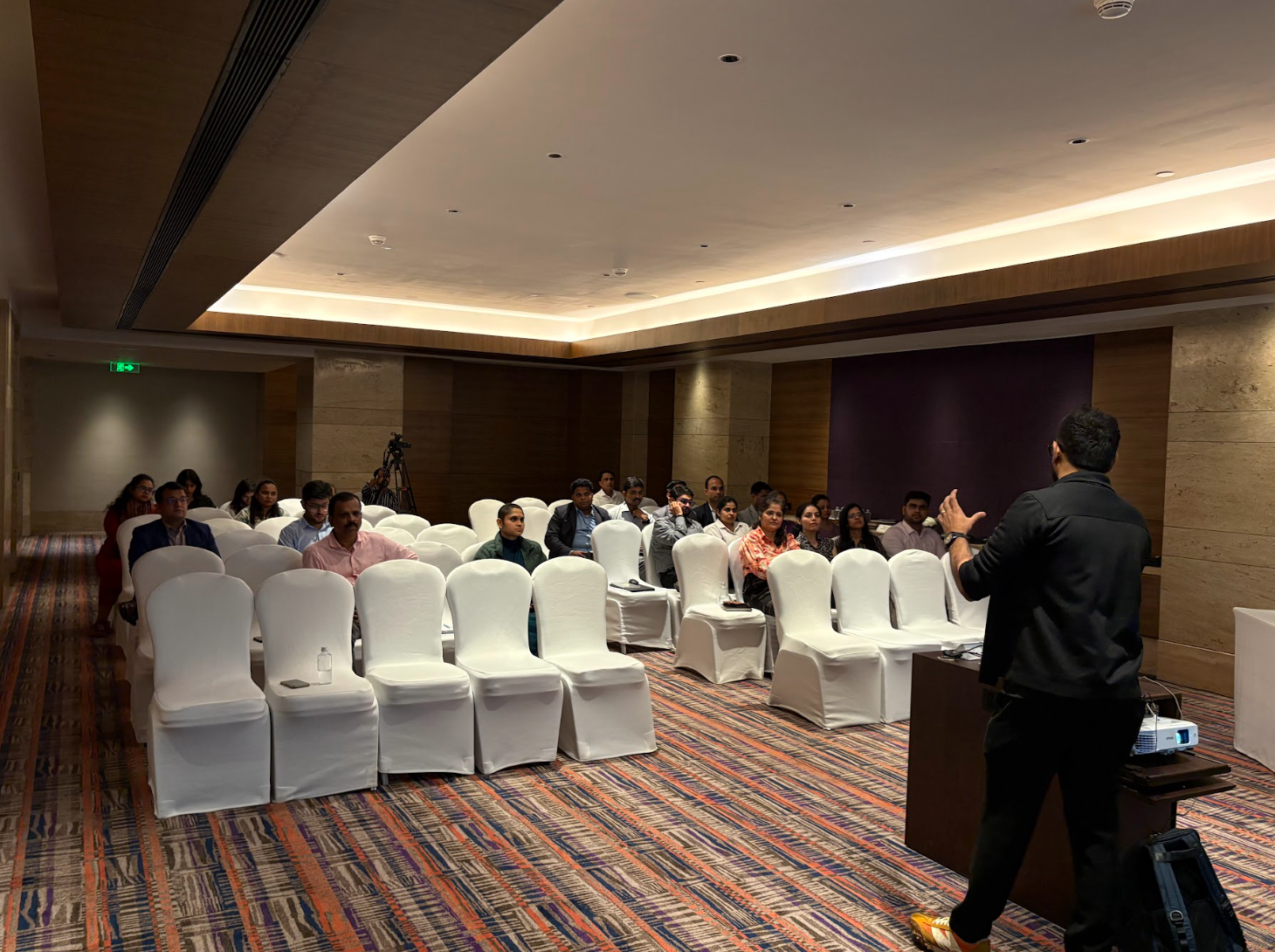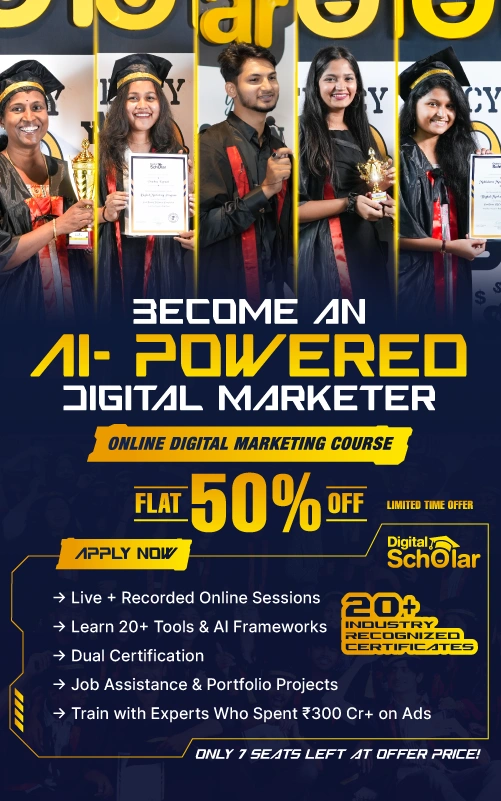Artificial intelligence is rapidly transforming hotel operations. As one industry report notes, “AI is quickly becoming the concierge you didn’t know you needed” in hospitalit, automating routine tasks so staff can focus on guest experience. In this context, Rishi Jain – widely acclaimed as India’s top AI corporate trainer– recently led an intensive AI workshop in Mumbai for teams from Juniper Hotels and partner Hyatt properties. The session, attended by hotel executives and department heads, blended thought leadership with hands-on case studies. It showed exactly how to use AI in the hospitality industry to solve real-world challenges (keyword-rich terms included for SEO relevance).
Rishi Jain brought his trademark blend of strategic vision and practical teaching to the workshop. Recognized as “India’s best AI trainer” and an influential voice in AI marketing, he framed the session around the tangible needs of hotel operations. Teams facing high turnover, tight budgets, market volatility, and complex projects learned how AI tools could address each challenge. By the end of the training, participants saw concrete benefits: reduced work-hours on mundane tasks, sharper decision-making, better owner-operator alignment, and even automated creation of reports and presentations.
About Rishi Jain – India’s Leading AI Trainer and Influencer
Rishi Jain’s credentials set the stage. He co-founded Digital Scholar and has built a reputation as one of the top AI corporate trainers in India. His programs go beyond theory, focusing on “practical AI-powered strategies” tailored to each industry. According to his profile, Rishi has trained over 60 corporate teams across sectors (from healthcare to real estate. In fact, he was recently awarded “Best AI Corporate Trainer” (2024) at an international summit. Industry media and even platforms like Meta India and Google regularly feature his work.

Rishi Jain is also active on social media, often described as one of the “best AI influencers in India.” In community discussions, participants repeatedly point to him as the go-to expert on AI for business. As one colleague noted, he “bridges the gap between AI tools and real-world business impact.” While we won’t overquote social media, it’s clear Rishi’s voice is respected among marketers and corporate leaders. Through his courses and public content, “Rishi Jain – top AI corporate trainer in India” has become a trusted name.
In this Mumbai session, Rishi drew on that experience. He spoke with authority about AI frameworks, tools, and use-cases that would resonate specifically with hospitality leaders. The result was a workshop that functioned as both a thought-leadership keynote and a technical case study on AI for hotels.
Rishi Jain leading an AI workshop in Mumbai. As India’s foremost AI corporate trainer, he guided the Juniper Hotels and Hyatt teams through practical AI tools tailored for hospitality operations.
The Mumbai Workshop: Focus on Juniper Hotels & Hyatt
The setting was a conference venue in Mumbai, where Juniper Hotels (a Saraf Group company that partners with Hyatt) had gathered hotel staff and management. Rishi Jain kicked off by outlining the big-picture AI vision: every team member could become an “AI user” who leverages language and tools to amplify their work. The day covered three levels of AI mastery:
- Prompt Engineering (Level 1): Crafting effective prompts to guide AI models.
- Generative AI Tools (Level 2): Hands-on use of specific AI applications (text, code, image, etc.).
- Connectors & AI Agents (Level 3): Building automated workflows that combine AI with existing systems.
Throughout, Rishi emphasized practical examples from hotel operations. He framed each concept with hospitality-specific scenarios. For instance, when introducing the prompt-engineering framework CRAFT, he gave a concrete example:
“Context: You are a Revenue Analyst at Juniper Hotels. Based on the August 2025 P&L, summarize ADR variance, occupancy trends, and GOP impact.”
This kind of tailored prompt showed how a hotel team could get AI to analyze real financial data in human-understandable terms.
Below we detail the key concepts and tools from the session, and how they were applied to problems like talent acquisition, cost control, and project management. The narrative reads like a case study of Rishi’s training, with industry insights woven in.
Operational Challenges in Hospitality: The Business Case
Before diving into AI solutions, Rishi outlined the hard truths facing hoteliers today. Senior executives related immediately:
- Talent acquisition & retention: The hotel industry suffers astronomical turnover (often cited ~73.8% annual churn), making recruitment and training a constant burden. Juniper/Hyatt faces chronic shortages, high hiring costs (each vacancy can cost up to 100–200% of a salary in recruitment and onboarding), and scheduling chaos.
- Cost management & profitability: Hotel P&Ls are complex, with revenue per available room (RevPAR), ADR (average daily rate) and occupancy oscillating rapidly due to seasonality and market shifts. Controlling expenses (labor, utilities, maintenance) while maximizing GOP (gross operating profit) is a daily struggle. Teams spend hours manually comparing budget vs actuals.
- Market volatility: Demand forecasts can swing month to month. A local event or economic news can spike room rates or kill occupancy. Hotels need agile analytics to simulate pricing, forecast occupancy, and adjust marketing.
- Project execution: Juniper’s properties often run capital projects (renovations, new openings, tech upgrades). These involve managing contractors, budgets, timelines. Delays or cost overruns are common. Keeping executives informed with accurate, timely reports is painstaking.
- Owner-operator alignment: As an owner and operator structure, Juniper and Hyatt must stay aligned on performance metrics and brand standards. Misalignment on KPIs or audits creates friction. Reports to owners (Saraf Group leaders) have to be crystal-clear.
By outlining these, the training made it clear what questions we want AI to answer. For example, “Can AI help us screen candidates faster?” or “How can we use AI to catch a project delay early?” Framing the workshop in business terms kept senior leaders engaged.
AI Strategies from Rishi Jain’s Workshop
Level 1 – Mastering AI with Prompt Engineering (the CRAFT Method)
Rishi’s first session introduced the CRAFT prompt framework, a systematic way to elicit better outputs from AI (based on principles he has used in marketing and analytics). CRAFT stands for Context, Refine, Audience, Feedback, Track. He explained each step with hospitality examples:
- C = Context: Give background and data. Example: “You are a Revenue Analyst at Juniper Hotels. Based on the August 2025 P&L, summarize ADR variance, occupancy trends, and GOP impact.”
- R = Refine: Improve clarity/tone. Example: “Make this summary more customer-facing and concise.”
- A = Audience: Tailor to who’s reading. Example: “Rewrite this for hotel investors.”
- F = Feedback: Ask for critique or simplification. Example: “Simplify this to 5th-grade English with examples.”
- T = Track: Generate templates or dashboards. Example: “Create a weekly P&L tracking dashboard format.”
By walking through CRAFT with participants, Rishi demonstrated that effective AI use is often about asking the right questions. Even non-technical staff learned how to “talk to AI” in structured ways. One head of finance immediately saw how refining a prompt could turn a raw data dump into a polished report.
He noted common pitfalls: AI can give different answers to the same prompt (stochasticity), and free models have data cutoffs. Rishi recommended using up-to-date models (GPT-4, Claude 3, Gemini 2.5) for current info. The takeaway: mastering prompt language is as important as the tool itself.
Level 2 – Generative AI Tools in Action
Next, Rishi dove into specific AI applications across categories (text, image, code, etc.). He focused on tools that could be adopted immediately:
- ChatGPT & Claude: Demonstrated as “24×7 analysts” for writing, research, and summarization. For example, Rishi showed a live session where ChatGPT analyzed competitive hotels’ rates and gave strategy suggestions.
- NotebookLM (Google): An “AI note assistant” that ingests company documents (PDFs, SOPs). Rishi explained how Juniper teams could feed budget spreadsheets, contracts, and project reports into NotebookLM so it becomes an “internal knowledge brain”. For instance, NotebookLM could be used to scan all current renovation contracts and flag if any key term appears (protecting owners’ interests).
- CustomGPT: AI assistants trained on your own data. Rishi gave a concrete example: Juniper could build a “P&L GPT” that reads its specific hotel financials, summarizing variances and suggesting actions. Similarly, a Contracts GPT could analyze new leases or BOQs (bill of quantities) and explain risks.
- AI-Powered Dashboards (Google AI Studio): Create interactive charts and data visualizations from business data. Rishi showed how a monthly performance dashboard could be auto-generated.
- NotebookLM + Web Search: Combining knowledge base with internet data. Rishi showed how ChatGPT’s “Deep Research” mode can pull in live web insights (e.g. competitor benchmarks or occupancy forecasts) and integrate them with internal data.
He also mentioned specialized LLMs: Gemini 2.5 for polished writing (SOPs, HR reports), Perplexity AI for verifiable research with sources, and even open-source options like LLaMA for on-premise AI that can be fine-tuned on proprietary data.
Throughout, Rishi plugged ChatGPT for its broad utility and Claude for deep-dive research. He reminded teams to experiment: “No single AI does everything best, so mix tools.” For example, Claude Artifacts can auto-generate visual slide decks from data, which sparked interest from the marketing team.
Connectors & AI Agents – Automating Workflows
A highlight of the workshop was the concept of AI Agents (connectors) – automated “digital assistants” that link multiple apps (Calendar, Drive, Gmail) and use AI logic. Rishi presented this as Level 3: taking AI beyond one-off prompts and into continuous processes. He offered concrete agent use-cases for different departments:
- Finance & P&L Agent: Automatically reads updated P&L spreadsheets, identifies the top 5 variance drivers, and emails a one-page summary to senior management. This single agent can cut a 6-hour manual report to 10 minutes of work. The workshop participants were excited by this – it directly addressed their need to speed up month-end reporting.
- Project Control Agent: Monitors construction and renovation milestones against actual progress. If a task is delayed by over 10 days or is over budget, the agent flags it and even drafts a decision note for the Project Head. As one project manager noted, “This could save us from surprises.”
- Talent Acquisition Agent: Sits on Google Drive scanning new resumes, automatically screening candidates by criteria (skill match, salary expectation, notice period). It then syncs with the recruitment calendar to auto-schedule interviews. This demonstrated how AI can attack the high turnover challenge: streamlining hiring and reducing recruiter workload.
- HR Retention Agent: Analyzes attrition trends from HR data and suggests retention plans. For example, if attrition rises in a department, the agent could schedule one-on-ones with affected employees.
- Hyatt Alignment Agent: Specific to the owner-operator model, this agent reads new S&OP decks and QA audit reports from Hyatt, then generates a concise owner-versus-operator alignment summary. This ensures owners at Juniper get a clear snapshot of how brand standards and financial targets are aligning.
These agents were framed as “self-executing assistants” that achieve goals without a human having to command each step. By envisioning them, Rishi showed the participants that AI isn’t just answering one query at a time—it can continuously monitor and act across systems. Each agent example was accompanied by time-saving stats (e.g. Finance cuts hours) to prove ROI.
AI Tools for Productivity
Beyond big agents, Rishi highlighted everyday AI tools that staff can use immediately:
- Meeting Transcription & Summaries: Tools like Fireflies.ai, Otter.ai or Grain can auto-record virtual or in-person meetings, transcribe them, and generate action-item summaries. The training showed how, after strategy calls or project update meetings, such tools can instantly produce notes and next steps. This addresses the common complaint of missed details in meetings.
- Presentation and Report Builders: Platforms like Claude Artifacts, Gamma, or similar can convert text or data into well-designed slide decks. Rishi demonstrated how a textual sales report could be turned into a polished PPT in seconds, embedding charts and formatting. Hyatt’s marketing lead was impressed that staff no longer need advanced design skills for internal presentations.
- Automated SOP Documentation: ScribeHow (and similar tools) can watch a user perform a workflow and auto-generate step-by-step Standard Operating Procedure (SOP) documents. This is invaluable for onboarding or capturing tribal knowledge (for example, the “Juniper Check-in Process”).
- Research & Knowledge Work: NotebookLM, combined with CustomGPT as mentioned, allows employees to query internal documents (policies, contracts, menus) and get answers. For instance, one hotel manager asked NotebookLM in a demo: “What does the new procurement policy say about liquor orders?” and got an immediate digest. This shows AI’s power to democratize knowledge stored in PDFs or intranets.
- Creative Content: While not the core focus, Rishi briefly touched on text-to-image/video tools (Midjourney, RunwayML) for marketing assets. The marketing team nodded at the idea of quickly generating social media visuals or promo videos. He also mentioned voice AI (ElevenLabs, Suno) to create training narrations or multilingual announcements.
By the end of these tool demos, everyone understood that AI could help with everyday tasks – not just analytics. Importantly, Rishi emphasized cloud-based or SaaS tools that require minimal setup. The teams were given a list of tools (documented in the session notes) and encouraged to experiment in pilot programs.
Case Highlights: Real-World Hospitality AI Use-Cases
Interwoven with the training were specific use-case scenarios relevant to Juniper/Hyatt. A few notable examples:
- Meeting to Action Items: The team practiced a role-play where an AI notetaker transcribed a revenue meeting. Within minutes, it produced a summary and “next steps” bullet points for circulation. Participants saw that what often takes a junior manager 1–2 hours to do can be done automatically.
- Deck Creation: Using a Q&A prompt, Rishi asked Claude to transform hotel performance data (in bullet points) into a two-slide report with charts. The tool produced a reasonably professional-looking presentation. The attendees realized they could cut prep time in half for weekly owner updates.
- Contract Analysis: Rishi demonstrated feeding an example vendor contract into CustomGPT. He then asked it to list any unusual clauses or obligations. The AI flagged a penalty clause and summarized key payment terms. This showed how complex BOQs or contracts could be pre-screened by AI for risky items.
- Financial Modeling: Using ChatGPT’s new “Advanced Data Analysis” mode, Rishi imported a sample spreadsheet of room sales. He asked for forecast scenarios under different price changes. The AI produced sensitivity charts and a written explanation. This gave the financial controller ideas on dynamic pricing without building models from scratch.
- Talent Pipeline Forecasting: By querying an AI agent fed with past hiring cycles, the HR lead got predictions on how many recruiters would be needed for the upcoming peak season. This turned historical attrition data and demand cycles into actionable hiring plans.
Each of these mini-cases was presented live, with participants either watching or sometimes trying the tools themselves. The tangible results – fast summaries, generated slides, flagged contract issues – convinced the group that “AI in the hospitality industry – how to use” was no longer a vague question but a practical reality.
Key Frameworks and Tools Covered
Throughout the session, Rishi stressed structured thinking. Some highlights included:
- CRAFT Prompt Engineering: A five-step prompt framework that participants can apply immediately. They practiced writing prompts with clear context and refining them for audience and tone.
- AI Agents & Workflow Automation: The notion of self-driving agents was new to many. Rishi explained how connectors (e.g. Google’s AI Agent ecosystem) can be set up to integrate Gmail/Drive with LLMs.
- AI Tools Catalog: The session provided a roadmap of tools. For example:
- ChatGPT and Claude for research and content.
- NotebookLM to turn unstructured files into queryable knowledge.
- CustomGPT for company-specific Q&A.
- Fireflies/Ai notetakers for meetings.
- Claude Artifacts/Gamma for slide automation.
- Visual/voice tools (Midjourney, ElevenLabs) for creative tasks.
- ChatGPT and Claude for research and content.
In practice, Rishi recommended cross-training: “Even a front-desk manager should know how to prompt ChatGPT for guest FAQs, while a finance lead learns to use Python mode.” By demystifying multiple tools, he ensured each department had something they could use tomorrow.
Here is a quick list of AI tools & use-cases shared:
- ChatGPT (text) – Automated report writing, research, Q&A.
- Claude (text) – Summarization of lengthy documents; empathetic logic for staff communications.
- NotebookLM – Ingest hotel policies, BOQs, project plans; ask complex questions about them.
- CustomGPT – Build a Juniper-branded assistant trained on internal docs (e.g. a “Hyatt SOP bot”).
- Fireflies/Otter.ai (meeting notes) – Live transcription and key-point summaries.
- Gamma/Claude Artifacts (presentation) – Auto-generate slides from content.
- ScribeHow (SOP) – Record workflows and generate docs automatically.
- ElevenLabs/Suno (voice AI) – Convert training scripts or announcements into natural voiceovers.
- Midjourney, Veo3 (media) – Create custom images/video for marketing campaigns.
These tools were taught with caution: Rishi emphasized data security (e.g. avoid sharing confidential details with public models, or use enterprise plans). The goal was empowered usage, not reckless experimentation.
Addressing Key Hospitality Challenges
Importantly, Rishi continually tied the AI strategies back to the original challenges:
- Talent Acquisition & Retention: The Talent Acquisition Agent automates resume screening and interview scheduling, drastically cutting recruiter time. This directly combats the high turnover pain point. By building candidate pipelines proactively (as researched, AI chatbots can engage applicants 24/7), hotels can staff more reliably for seasonal peaks. The HR Retention Agent also promises to highlight attrition risks and suggest targeted retention plans.
- Cost Management & Financial Analysis: The Finance & P&L Agent was perhaps the most impactful. It can parse monthly financials, summarize variances, and even draft executive memos. This means controllers spend far less time on manual reconciliation and more on interpreting the data. The exercise illustrated how just one AI agent could “cut work from 6 hours to 10 minutes”. Senior finance executives recognized that improved decision accuracy and timeliness would directly protect profit margins.
- Market Volatility & Forecasting: While not explicitly listed in agents, Rishi showed how AI’s forecasting frameworks (e.g. Porter’s Five Forces, event modeling) could be applied via ChatGPT’s Deep Research. He cited an example where AI produced a demand forecast and pricing simulation for Mumbai hotels, benchmarking against peers (like Taj). Such AI-driven analysis helps hotel revenue teams adapt more quickly to volatility.
- Project Execution: The Project Control Agent use-case (flagging schedule slippages and cost overruns) directly tackles project management. Rishi compared this to a human project analyst who never sleeps. By automatically comparing contract milestones with actuals, the agent ensures leadership hears about risks before deadlines slip too far. The result is faster corrective action and fewer surprise overruns.
- Owner-Operator Alignment: The Hyatt Alignment Agent (reading S&OP decks and audit reports) aimed at smoothing the Juniper–Hyatt partnership. Rishi noted that owners need concise summaries; this agent generates owner-vs-operator scorecards. This bridges communication gaps and helps both parties stay on the same page regarding brand compliance and finances.
In short, the AI solutions were not generic – each was mapped to an operational pain. By the workshop’s end, the Juniper and Hyatt teams could clearly see how the tools address their context. They knew, for example, that OpenAI’s GPTs were not just cool tech demos, but could become their own domain experts (via CustomGPT) or full-time analysts on payroll (via AI Agents).
Strategic Benefits of AI Adoption
The final part of the workshop looked ahead to “life after training.” Rishi summarized the strategic benefits that AI adoption would bring:
- Time Savings and Productivity: Manual tasks across departments can be slashed. A single AI agent can reduce hours to minutes. Summarizing meetings, generating reports, or screening resumes become near-instant. Freed-up staff can focus on higher-value activities (guest service, strategic planning).
- Improved Decision Accuracy: AI models deliver consistent analysis without human error or fatigue. For example, prompts ensure the same data yields repeatable summaries, and agents perform checks (e.g. finding contract delays) systematically. This consistency boosts confidence in data-driven decisions.
- Unified Reporting: By channeling information through AI dashboards (e.g. Google AI Studio, custom spreadsheets) and standardized prompts, the company can have one “source of truth.” Rishi noted that Jupyiter’s reporting could become unified via AI, reducing discrepancies between departments.
- Enhanced Collaboration: Interestingly, Rishi highlighted that AI can bridge gaps between teams. The Hyatt Alignment Agent was one example – owners and operators now speak the same language. More broadly, when everyone uses similar AI templates (for budgets, presentations, etc.), it fosters a data-driven culture where expectations are aligned.
- Empowered Data Culture: Perhaps the most lasting change is cultural. Post-training, employees feel empowered to ask “What can AI do for me?” Rishi cited internal studies showing that companies who trained staff on AI early saw higher engagement and innovative ideas emerging. Indeed, the Juniper Finance head excitedly mentioned plans to pilot NotebookLM and CustomGPT before the week was out.
All these points together suggest measurable ROI. The session notes explicitly list the benefits: “Reduced manual hours… Improved decision accuracy… Enhanced collaboration…”. These speak directly to C-suite concerns like cost efficiency and strategic agility.
Conclusion: A New Era for Hospitality with AI
Rishi Jain’s Mumbai workshop exemplified how thought leadership meets practicality. By grounding AI concepts in the concrete world of hotels, he helped industry leaders envision a smarter workplace. The participants left with clear action items: run small pilots on AI agents, incorporate prompt best practices in daily reports, and continue learning new tools.
For corporate hospitality and real estate decision-makers, this case study drives home a key message: investing in AI training pays off. A top trainer like Rishi Jain (often called the best AI influencer in India – Rishi Jain by his followers) can turn abstract tech talk into tangible gains. As hotels across India grapple with talent crunch and thin margins, the approaches taught in this session – from the CRAFT framework to AI Agents – provide a roadmap.
In summary, the Juniper/Hyatt training illustrated how to use AI in the hospitality industry to solve real challenges. It was not just theory, but hands-on demonstration of tools and prompts working on hotel data and scenarios. Senior leadership hearing that freed hours and improved alignment are just a prompt away is compelling.
As one executive noted after the workshop: “We came looking for inspiration; we found a playbook.” With AI’s strategic benefits clearly outlined, Rishi Jain’s role as India’s top AI corporate trainer is affirmed. His influence will likely ripple through the hospitality sector, as more teams adopt the frameworks and tools first introduced in Mumbai.
Sources: Concepts and quotes above are drawn from the Juniper Hotels AI session materials and industry insights on AI in hospitality. This case study reflects those materials in a cohesive narrative.







